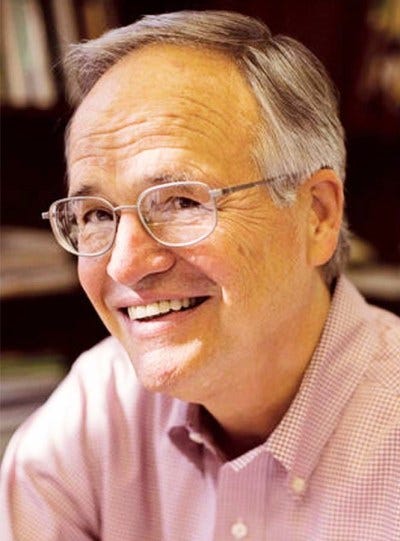Building a company or a country is akin to baking a cake: you gather a set of ingredients not of your own making and from that form an emergent whole.
In the cake’s case, it’s things like eggs, flour and fat. In a company it’s things like money, people and trees. In economic circles these ingredients, these resources, are referred to as ‘capitals’: financial capital, human capital, natural capital. Resources you can use, steward and invest towards a common goal. Resources you can also deplete.
One capital that is ever present but rarely formally discussed, particularly in an enterprise context, is ‘Spiritual Capital’.
Spiritual Capital is not without academic attention, far from it. Questions of Spiritual Capital and its impact on socio-economic issues looms large across the centuries, from Max Weber to Adam Smith. In the 20th Century, Nobel prize winning secular economist Robert Fogel argued for investment in spiritual resources.
But given we are in a sea of discussion over the need to prioritise social, natural and human capital and awash with debate over the sins of our past and the soul of our future it would be a mistake to overlook the one that underpins them all: our Spiritual Capital.
It's time we gave it more deliberate attention.
-----
What is Spiritual Capital?
Spiritual Capital is not the same as ‘social capital’: an easy misunderstanding in a culture that conflates the spiritual and the social. Social capital, according to Prof. Robert Putnam (one of its primary academics), is concerned with issues like social networks and their reciprocity: customs, language, community etc.
Spiritual Capital is focused on a culture’s religious, spiritual and wisdom traditions. The meta-story people live within and the beliefs, values and outcomes that emerge. It includes concepts such as purpose, values and meaning; the power of rituals, rites and communities of spiritual practice; the patterns people live by; and the impact of mystery and mysticism.
Lastly, Spiritual Capital, much like financial or natural capital, has both a universal and a locational element. Finance is everywhere but currency, fiscal landscape and monetary history differs between geographies. Nature is the same: we wouldn’t steward the English countryside as if it were the Sahara. And so it is with Spiritual Capital: the concept is universal but its current and historic reality presents localised characteristics and implications that we can’t simply overlook. The universalist perspective that “all faiths are basically saying the same thing” actually reveals more about modernity’s poverty of religious awareness than it does our grasp of universal truths.
What is Britain’s Spiritual Capital?
In Britain, the meta-spiritual arc has been predominantly across Celtic and Anglo-Saxonism, Christianity and secularism. All of which play a role in characterising the current tapestry of our spiritual landscape. With a growing diversity and quantity of other spiritual worldviews now playing an increasingly influential role.
When it comes to the nature of our Spiritual Capital, modern individuals are often under educated on its constituent influences leading to blind assumptions about what is supposedly ‘self-evidently true’ (e.g. all humans are equal) or ‘self-evidently false’ (e.g. ‘mythology is fiction’) without considering where these ideas actually come from. Self evident truths may seem obvious to us but that doesn’t mean they always have been and self evident falsehoods may seem like silly superstitions but perhaps they persist for good reason.
For example, the British are so utterly soaked in Judeo-Christian thinking that most have no idea just how culturally Christian they are. Which is why even the atheist intellectual Richard Dawkins refers to himself as a ‘cultural Christian’, even though he doesn’t believe a word of the Bible. Just as, in reverse, today’s British Christians are so utterly soaked in the enlightenment’s scientific materialism they have no idea just how scientifically materialist they are, even though they would hold a deeply immaterial worldview. Which is one reason the contemporary church has such a diminished connection with symbolism and nature.
Why does Spiritual Capital matter and why now?
Britain’s Spiritual Capital is at an inflexion point, as it is for the West as a whole. It is the topic that joins the dots between the resurgence of public intellectualism; the nature of the meaning crisis; the ethical pressures being applied to business; the increased social caché of being spiritual; and the politicisation of ethics and religion. With so much at stake it is vital to have an informed dialogue about the health and character of our spiritual dynamics.
The impact of Spiritual Capital is enormous. If we choose to deplete it without reinvestment the consequences could be significant. Prof. Putnam found that nearly half of all associational memberships, personal philanthropy and volunteering in the USA is church-related, stating that “faith communities in which people worship together are arguably the single most important repository of social capital in America”. Declining religious affiliation therefore begs the question how much social capital might be lost with it and what cultural movements could counter that reality.
The same goes for commerce. Remove things like ethics, trust, purpose and meaning and it (gradually?) disintegrates. The 2008-10 financial crises reasserted this reality and put purpose and responsibility back on the map. Likewise, ratcheting environmental concerns are forcing companies to act differently to their forebears.
But the response, particularly in terms of addressing social and environmental concerns, has been almost entirely materialist. We appear to see only material causes, material effects and material solutions. None of which are solely sufficient. In the words of Gus Speth, Co-Founder of the Natural Resources Defence Fund:
“I used to think the top global environmental problems were biodiversity loss, ecosystem collapse and climate change. I thought that with 30 years of good science we could address these problems. But I was wrong. The top environmental problems are selfishness, greed and apathy, and to deal with these we need a spiritual and cultural transformation, and we scientists don't know how to do that.”
Speth’s experience is the classic, contemporary approach to Spiritual Capital: something to be considered once all other needs and avenues have been satisfied or exhausted. It comes last. As opposed to it coming first and being a primary source of wisdom and conviction that compels, informs and encourages change.
However, we must be realistic that Westerners have been educated and raised in a world where the sacred and theological are neither high on the learning hierarchy nor quick in our cultural instincts. As such, organisations must recognise they can’t make all the Spiritual Capital they need themselves, just as they can’t make the people and trees they use. Which is why businesses talking to businesses in corporate lingo about culture change without reference to external wisdoms so often ends up as just more of the same: technocracy dressed up as thought leadership. Corporates wouldn’t employ a monastery to write their legal contracts, but they would employ a law firm to conduct an independent ethics review. How different might it be?
Equally, take the ‘business as a force for good’ movement within the UK. Before it went mainstream it was awash with religious and spiritual people, just as it was with Britain’s historic social entrepreneurs like Guinness, Cadbury and Wedgewood. Whilst they weren’t the only perspectives in the room, dialogues about philosophy, spirituality and theology were, nevertheless, far above the level you would find in other commercial settings and these exchanges helped nurture the cultures and capabilities to work against the grain. As the movement caught on, more and more individuals joined that arena who felt an affinity to the concept but lacked any religio-spiritual leanings. Although, importantly, it was the preexisting Spiritual Capital within British culture as a whole that supported the growth of any such movement at all, with or without spiritually inclined people involved. And whilst the influx of fresh, individual perspectives was not a problem in and of itself (indeed the whole point was to become a movement for everybody) there have been consequences to this shift. Perhaps most notably has been a gradual displacement of those earlier conversations with ones focused on politics, regulation and activism and the increased prioritisation of science and data as a primary motivator for change. That is not to say those perspectives don’t have their place: they certainly do. But they can become a mixed blessing if viewed as the only serious ‘hows and whys’ of change, particularly if accompanied by a drowning out or even a rejection of the very worldviews that helped seed it in the first place.
However, it feels like we are now going full circle. A rising number of people appear to be reaching the same conclusion as Gus Speth: a kind of spiritual recapitalisation is needed. It is the common thread linking the platforming of indigenous wisdom; the personal development programmes connecting ‘heart with head’; the corporate retreats focused on being in the wilderness; the shift towards regenerative over sustainable thinking; the pursuit of mindfulness, and so on.
Some words of warning as we do, though.
Firstly, a reminder that Spiritual Capital has both a universal and localised component. For the British this means being honest about how our Celtic and Christian heritage informs how we see the world as well as our enlightenment sensibilities. Which can be a challenge in a culture with a hesitancy towards religio-spiritual dialogues in secular contexts. But the truth is we cannot hold an integrous conversation about corporate ethics without being honest about the wells from which we draw some of those ideas. Equally, it means that importing, say, indigenous wisdom from South America or Eastern philosophies from Asia into dialogues about corporate culture will require more self education and cultural bridging than we think it does. We too easily treat spiritual wisdoms like they are a simple case of ‘drag and drop’. It doesn’t work like that.
Secondly, our lack of spiritual intelligence can lead us into shallow impersonations of the real things. Our individualistic, self-affirming norms have convinced us we are all capable of being the spiritual influence the world needs whenever we feel like it. That we can simply make it up as we go along. And self certifying ourselves as “I’m a good person, you know” is a sufficient qualifier to do it well. Contributing to Spiritual Capital is more challenging than standing on a hilltop, having deep thoughts by yourself and then posting about it. Just as growing our financial and natural capital requires informed thinking, or improving our physical health requires discipline, so does Spiritual Capital and personal spiritual development. For example, the reason so much Spiritual Capital emerges from religious communities or communities of spiritual practice is not simply because of their deep thinking bits, it is because of their community bits. Spiritual growth gets real when you’re willing to be vulnerable with people where vulnerability might come at a price; be accountable for where you’ve made a mess in your life; forgive others who’ve made a mess in yours; stay friends with people you strongly disagree with; trust the longevity of traditions over your ability to understand them; brave mysteries bigger than yourself in the company of others; and empower people to speak into your life to ensure your focus is on the transformation of the self over the transformation of others. In fact, there is nothing quite like being in a spiritual community to make you realise the last thing you’d want to base your spiritual integrity on - or indeed the Spiritual Capital of a nation - are the cobbled together ideas of a sole human being, particularly yourself.






Thank you John, It has been really useful to read this combined with some of what Satish Kumar has been sharing about spirit.